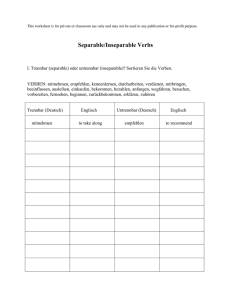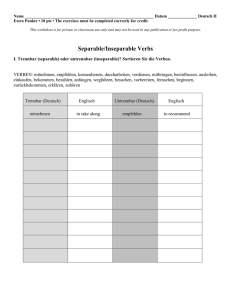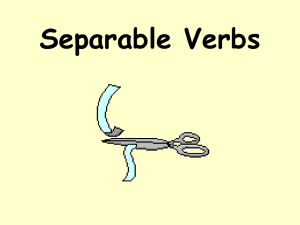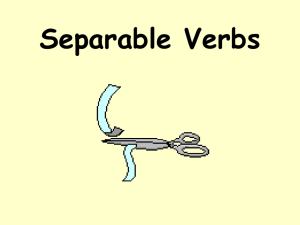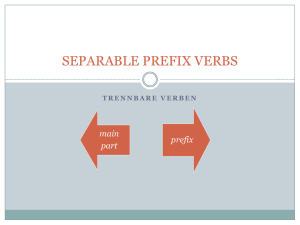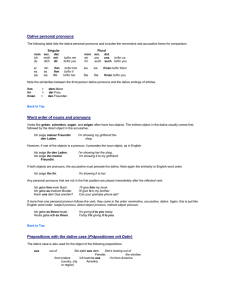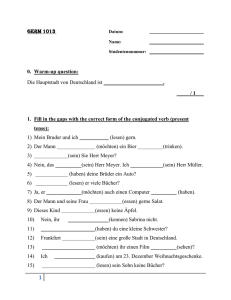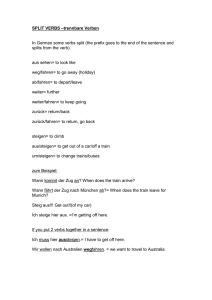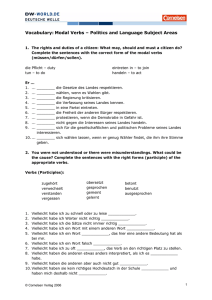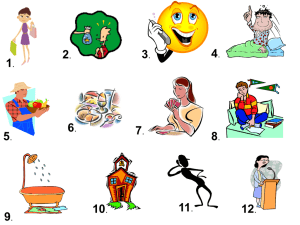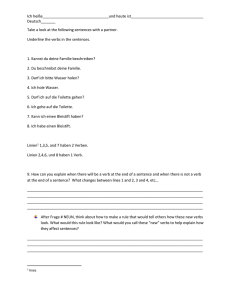v_04: separable prefix verbs
Werbung
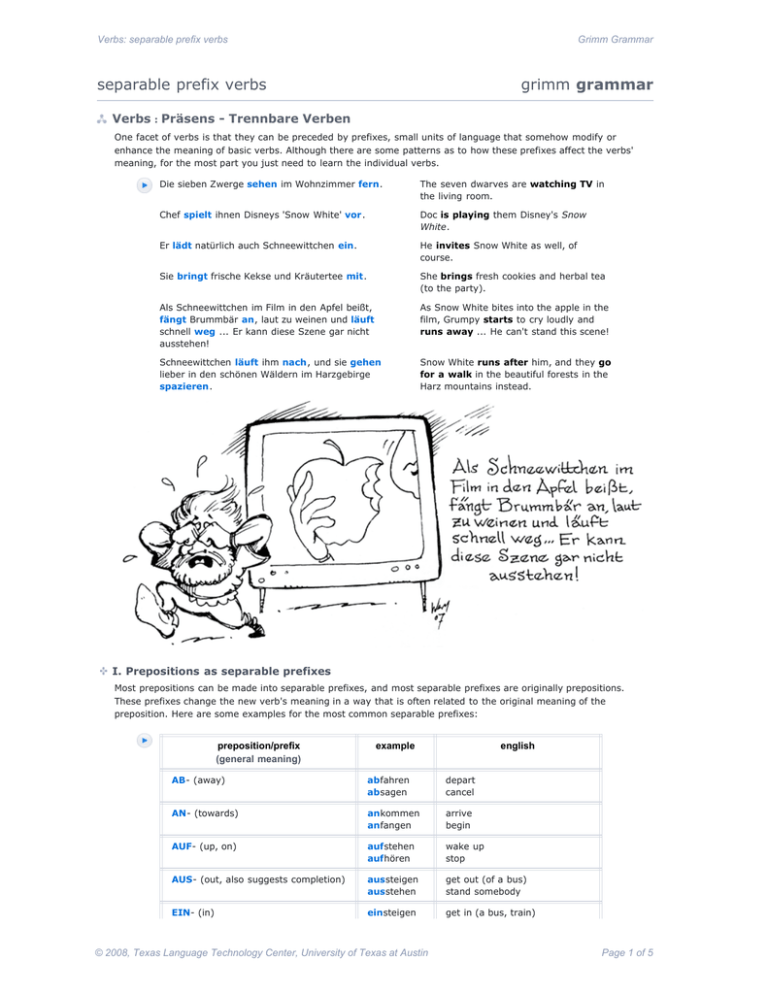
Grimm Grammar Verbs: separable prefix verbs separable prefix verbs grimm grammar Verbs : Präsens - Trennbare Verben One facet of verbs is that they can be preceded by prefixes, small units of language that somehow modify or enhance the meaning of basic verbs. Although there are some patterns as to how these prefixes affect the verbs' meaning, for the most part you just need to learn the individual verbs. Die sieben Zwerge sehen im Wohnzimmer fern. The seven dwarves are watching TV in the living room. Chef spielt ihnen Disneys 'Snow White' vor. Doc is playing them Disney's Snow White. Er lädt natürlich auch Schneewittchen ein. He invites Snow White as well, of course. Sie bringt frische Kekse und Kräutertee mit. She brings fresh cookies and herbal tea (to the party). Als Schneewittchen im Film in den Apfel beißt, fängt Brummbär an, laut zu weinen und läuft schnell weg ... Er kann diese Szene gar nicht ausstehen! As Snow White bites into the apple in the film, Grumpy starts to cry loudly and runs away ... He can't stand this scene! Schneewittchen läuft ihm nach, und sie gehen lieber in den schönen Wäldern im Harzgebirge spazieren. Snow White runs after him, and they go for a walk in the beautiful forests in the Harz mountains instead. I. Prepositions as separable prefixes Most prepositions can be made into separable prefixes, and most separable prefixes are originally prepositions. These prefixes change the new verb's meaning in a way that is often related to the original meaning of the preposition. Here are some examples for the most common separable prefixes: preposition/prefix (general meaning) example english AB- (away) abfahren absagen depart cancel AN- (towards) ankommen anfangen arrive begin AUF- (up, on) aufstehen aufhören wake up stop AUS- (out, also suggests completion) aussteigen ausstehen get out (of a bus) stand somebody EIN- (in) einsteigen get in (a bus, train) © 2008, Texas Language Technology Center, University of Texas at Austin Page 1 of 5 Grimm Grammar Verbs: separable prefix verbs einladen invite LOS- (indicates beginning something) losgehen losbrechen get started break loose/escape (break out) MIT- (with, along) mitbringen mitkommen bring along come with, come along NACH- (after, follow) nachholen nachlaufen make up (work, homework) run after someone (literally) VOR- (before, ahead, forward) vorlesen vorspielen read out loud play (e.g., a film) WEG- (away) wegwerfen weglaufen throw away run away II. Other common separable prefix verbs fernsehen - watch TV spazierengehen - go for a walk Rad fahren - ride a bicycle schwarzarbeiten - work illegally teilnehmen - participate schwarzfahren - ride (e.g., a train) without a ticket kennenlernen - get to know achtgeben - pay attention III. Word order and separable prefixes A. Declarative sentences The separable prefixes affect word order in basic sentences; they also have slightly different participle forms. The typical word order in basic German (declarative) sentences is SUBJECT-VERB-VERBAL COMPLEMENTS. While this order stays the same for the most part, the separable prefix of the separable prefix verb goes to the very end of the declarative sentence. parts of the sentence subject verb other items that complete the verb (e.g., direct object) declarative sentence Chef spielt Tennis. declarative sentence with a separable prefix verb Chef spielt den Film separable prefix vor. B. Questions Separable prefix verbs affect the word order in questions as well: parts of the sentence subject/question word verb verbal complements/subject separable prefix declarative sentence Chef spielt den Film vor. Who? Wer spielt den Film vor? What? Was spielt Chef vor? C. With modal verbs Modal verbs affect the word order of sentences with separable prefix verbs, too: parts of the sentence subject primary verb verbal complements/subject declarative sentence Chef spielt den Film vor. modal verb: wollen Chef will den Film vorspielen. question with modal verb Was will Chef vorspielen? © 2008, Texas Language Technology Center, University of Texas at Austin separable prefix/infinitive Page 2 of 5 Grimm Grammar Verbs: separable prefix verbs D. With subordinating conjunctions Finally, separable prefix verbs move around when different phrases are connected by subordinating conjunctions (and also by relative pronouns). subordinating conjunction subject/question word verb verbal complements/subject separable prefix Chef spielt den Film vor. Chef lädt Schneewittchen ein. Bevor (before) Chef -- den Film vorspielt, lädt er Schneewittchen ein. Nachdem (after) Chef -- Schneewittchen einlädt, spielt er den Film vor. Brummbär Ich möchte diesen Film wegwerfen!!! Ich will ihn nie wieder anschauen! I would like to throw away this film!!! I never want to watch it again! Schneewittchen Nachdem du die DVD wegwirfst, lesen wir dein neues Drehbuch für diese Geschichte! After you throw away the DVD, let's read your new screen play for this story! Brummbär Ahm ... Es ist noch nicht fertig. Und weiterhin ist es ein bisschen kitschig ... Ahm ... Die Hexe kann dich natürlich nicht umbringen, und ich bin der Held, und obwohl du den Prinzen kennenlernst, heiratest du mich ... Hmmm ... Ahem ... It's not finished yet. And furthermore, it's also a bit kitschy... Ahem ... The witch of course can't kill you, and I am the hero, and although you meet the prince, you marry me ... Hmmm ... Schneewittchen Mein lieber Brummbär, du bist echt süß! Aber du solltest deine Karriere nicht aufgeben! My dear Grumpy, you are really sweet! But you should not give up your (day)job! Below are some of the most commonly used separable prefix verbs with English equivalents. The first column offers some general meanings associated with the prefixes, but these are only tendencies, not set rules. preposition/prefix (general meaning) example english AB- (away) abbrennen abgeben abkürzen abnehmen abschließen abtreiben burn down turn in (homework), hand over (ticket) shorten lose weight finish, complete abort AN- (towards) anerkennen andeuten angeben anklagen ankleiden anschauen anstellen anweisen anwenden recognize hint at, suggest brag, show off accuse dress watch hire, employ instruct use AUF- (up, on) aufatmen aufbleiben aufführen aufklären auflockern aufnehmen aufräumen breathe a sigh of relief stay up (person), stay open (store) perform (e.g., theater play) inform, enlighten, clear up liven up (a party, person) take a picture of (incl. video images) tidy/clean up (e.g., room) © 2008, Texas Language Technology Center, University of Texas at Austin Page 3 of 5 Grimm Grammar Verbs: separable prefix verbs aufräumen aufschlagen aufwachsen tidy/clean up (e.g., room) open (eyes, book) grow up AUS- (out, also suggests completion) ausbilden ausbrechen ausdrucken ausdrücken ausflippen ausgeben ausgehen auslachen ausmachen ausnutzen ausschließen aussprechen aussterben austauschen educate, train break out print (e.g., text, picture) express freak out (flip out) publish, hand out go out, date laugh at (someone) turn off (light), put out (fire) take advantage of (person, opportunity) lock out, exclude pronounce die out, go extinct exchange EIN- (in) einbrechen einfallen (es ist mir eingefallen) einführen einkaufen einleben (sich) einnehmen einrichten einschätzen einschlafen einschüchtern einwerfen einziehen break in (horse, into house) occur (to someone), come to mind introduce (a topic) go shopping, buy get used to earn, make money furnish (apartment), arrange (furniture) judge, guess (e.g., at size, value) fall asleep intimidate, bully throw in (e.g., remark, towel) move in (e.g., into a new apartment) LOS- (beginning something) losfahren loswerden get going, leave get rid of, spend, lose MIT- (with, along) mitbekommen mitfahren mitfühlen mitmachen mitnehmen mitspielen mitteilen get out (of a lecture), understand ride along sympathize participate, do something w/someone take along play along (in a sport) inform, share knowledge NACH- (after, follow) nachahmen nachdenken (ich möchte darüber ~) nacherzählen nachfolgen nachgeben nachprüfen nachschlagen nachtun nachzählen imitate think about (I'd like to think about that) retell, relate (a story) follow, succeed (e.g., a king) give in (e.g., to pressure) double check (e.g., essay, homework) look up (e.g., a word in a dictionary) follow somebody's example re-count (double check numbers) VOR- (before, ahead, forward) vorbereiten vorbestellen vorhaben vorkommen vornehmen vorstellen vortragen prepare order in advance (e.g., books) plan, have in mind come up, happen carry out a task introduce, imagine perform (play), give lecture/opinion WEG- (away) wegbleiben wegbringen weggehen wegnehmen wegräumen wegtreten wegziehen stay away take/bring away go away take away clear away (e.g., mess) step away pull away © 2008, Texas Language Technology Center, University of Texas at Austin Page 4 of 5 Grimm Grammar Verbs: separable prefix verbs Übung Fill in the blanks with the correct form of the verbs from the word bank that complete the sentences in a meaningful way. Word bank aufatmen einkaufen aufnehmen vorhaben vorspielen vorstellen nachdenken ausgehen einfallen anschauen mitkommen spazierengehen 1. Der Prinz: Was __________ ihr __________? 2. Chef: Wir __________ 'Snow White' wieder __________ 3. Der Prinz: Ich __________ lieber im Wald __________; das Wetter ist so schön! 4. Der Prinz: Warum __________ ihr nicht __________? Ihr sollt mehr Sport treiben! 5. Happy: Nein, wir bleiben lieber hier. Wir finden diesen Film sehr kathartisch: wir __________ alle erst __________, wenn der Prinz Schneewittchen rettet! 6. Der Prinz: Also, ich muss los. Nach dem Spaziergang __________ ich auch __________, wir brauchen Brot, Käse, Obst und Kaffee für unsere Party heute Abend. 7. Chef: Und __________ du wieder __________, deine Gedichte zu lesen? 8. Der Prinz: Ja, natürlich! Alle lieben meine Dichtung (poetry)! __________ du mich wieder auf DVD __________? 9. Chef: Ach, tut mir leid, ich kann nicht. Da __________ mir gerade __________, ich habe heute Abend eine Verabredung (date)! 10. Der Prinz: Aha! Wer ist sie? __________ du sie uns __________? Wann können wir sie treffen? 11. Chef: Ich __________ darüber noch __________. Ich möchte unsere Beziehung (relationship) noch nicht öffentlich machen (publicize). 12. Chef: Aber ehe (before) du fragst, ich weiß nocht nicht, wohin wir __________! © 2008, Texas Language Technology Center, University of Texas at Austin Page 5 of 5
